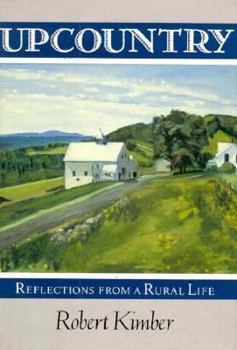Upcountry
Select Format
Select Condition 
Book Overview
Kimber shares his adventures, misadventures, and reflections as a part-time farmer and fetcher of firewood, his struggles with recalcitrant sheep and aging tractors, the joys of roaming the hills with... This description may be from another edition of this product.
Format:Hardcover
Language:English
ISBN:1558211217
ISBN13:9781558211216
Release Date:January 1991
Publisher:Lyons and Burford Publishers
Length:178 Pages
Weight:0.65 lbs.
Dimensions:0.8" x 5.8" x 8.5"
Customer Reviews
1 rating
Insightful essays on farm life in Maine
Published by Thriftbooks.com User , 15 years ago
Robert Kimber has produced an excellent collection of 29 essays, all but one of which originally appeared in other forms, sometimes substantially revised. He and his wife Rita left their academic life in Cambridge 25 years ago to create a life of subsistence farming, writing, translating and editing in Western Maine. He explains his need to live this life by quoting Aldo Leopold in A Sand County Almanac (Outdoor Essays & Reflections): "There are some who can live without wild things, and some who cannot. These essays are the delights and dilemmas of one who cannot." Kimber adds: "The wild things take in, of course, not just the birds and beasts, but also the lupine and the meadowsweet, the snowflakes, the sun coming up over the hills in the east and dropping over the hills in the west. I'm just among the some who cannot live without them." He likes the area even though there are no ocean views. "The hills are steep; the soil is poor. You can log some of this country with difficulty and farm less of it with even more difficulty, so you wind up doing some of each." Each essay brings a special joy of its own. He "gets lost" in a triangular piece of land, half a mile on each side. "Being lost, whether for five minutes or half an hour, is unsettling at the time but, in retrospect, always a bracing corrective." The dichotomy, a negative followed by a positive recurs in essay after essay, giving a deeply satisfying feeling to each. You can agree with either half, or both, or even neither, and enjoy the intellectual journey however you take it. His essay on trash wood was especially pointed for me. I was almost in a rage as he talked about the glories of cutting every bit of dead wood into burnable sizes, especially the creating of "biscuit wood", bone dry white birch that can bring an oven to 450 F in a matter of minutes. He glories in the fact the wood is cheap and close at hand, that one can be smug about using something that would be left to rot or burn in great brush piles in the spring. He considers the beauty of a perfectly manicured wood lot with no dead trees, no downed branches, smugness personified. And then, as I considered the fallen trees and dead limbs filled with insects and four types of woodpeckers in our quarter acre of woodland, on the verge of tossing the book away, Kimber makes the counter argument much better than I could. "The point is embarrassingly simple: In nature there is no trash; and 'trash wood' is a contradiction in terms." If you love nature, if you love farming, if you love people who make do and do well, you will enjoy this series of essays, and re-read them with pleasure. Robert C. Ross 2009





